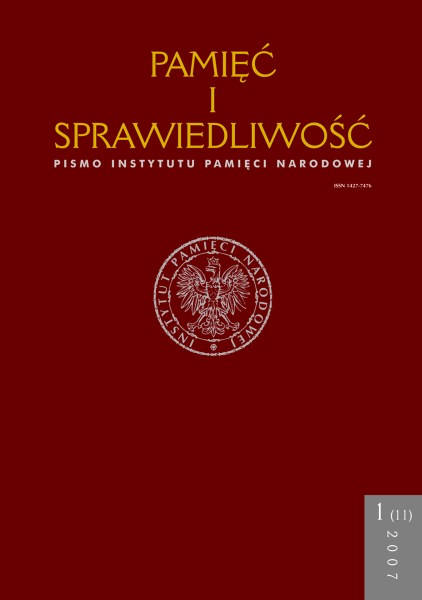Kampania wyborcza do Sejmu PRL w latach 1972, 1976, 1980 na przykładzie prasy dolnośląskiej
Pamięć i Sprawiedliwość, Bd. 11 Nr. 1 (2007), pages: 335-358
Publication date: 2007-12-30
Abstract
In a democratic country elections are the basis of its system. In the period of 1972–1980 voting was a kind of a fetish made for western countries to legitimise communistic authorities. Polish society was threatened and lied to.
After the December events and changes on the top of the authorities new elections had to be held. In the atmosphere of common enthusiasm and with fascination with the new leader, Edward Gierek, little attention was paid to the fact, that “Silesian” government resigned from introducing changes in electoral law and that propaganda apparatus was alleged to fi t to new demands.
In 1972 in the fi rst pre-election period the information given covered: decision on the date of elections, State Election Committee activities, and division into electoral districts. “Gazeta Robotnicza” and “Słowo Polskie” quoted speech of Henryk Jabłoński in Citizens’ Committee of the Front of Nation’s Unity (OK FJN) and a text of election declaration. “Gazeta Robotnicza” began a series of articles “Before we stand at the Ballot Box” with the article by Julian Bartosz. This was a kind of a commentary for directives of the Sixth Assembly and FJN programme. “Słowo Polskie” concentrated on two topics: checking election lists and preaching about the importance of voting in parliament elections.
In 1976 pre-election campaign in Lower Silesia press began after changes in the Constitution enacted by the parliament. In “Gazeta Robotnicza” a series “Elections to the parliament and Provincial National Councils” led by Jacek Sarnowski was proposed. The series was to explain the important differences between voting in 1972 and 1976, underlining the relevance of implemented
changes. Members of parliament were to be shown as hard working and responsible people, who were having a great impact on development of the state and its economy. A series of socio-political articles popularised decisions of the Seventh
Assembly, and journalists would repeat sentences about building strong, socialist and rich Poland.
The most interesting election campaign in 1980 was presented by “Wieczór Wrocławia”. In the series of articles Wrocław society was shown the most important building sites of the socialism, which were to make life easier. When analysing election campaign in 1980 in Lower Silesia one must not forget that official press was not the only source of information any more. In the second issue of 1980 “Biuletyn Dolnośląski” it was stated, that “Elections should be elections. They are a comedy”.
None of the activities undertaken by PZPR to attract people to ballot boxes brought desirable results. The authorities had to use forgery and lies. Official number of 97–99% of voters did not convince anyone, instead, the growing crisis led to anger among the society.
Am häufigsten gelesenen Artikel dieser/dieses Autor/in
- Stanisław Bereś, Jerzy Brukwicki, Andrzej Chojnowski, Emilian Kamiński, Marek Nowakowski, Zygmunt Staszczyk, Sebastian Ligarski, Patryk Pleskot, Twórcy o twórcach w PRL , Pamięć i Sprawiedliwość: Bd. 24 Nr. 2 (2014)
- Sebastian Ligarski, Twórcy, władze PRL, bezpieka. Raport o stanie badań 2014–2022 , Pamięć i Sprawiedliwość: Bd. 40 Nr. 2 (2022)
- Marta Marcinkiewicz, Sebastian Ligarski, Od Redakcji , Pamięć i Sprawiedliwość: Bd. 40 Nr. 2 (2022)
- Sebastian Ligarski, Polityka władz komunistycznych wobec twórców kultury w latach 1945–1989 , Pamięć i Sprawiedliwość: Bd. 24 Nr. 2 (2014)
- Sebastian Ligarski, [Recenzja] Polska 1944/45–1989. Studia i materiały, t. 6: Warsztat badawczy, Instytut Historii PAN, Warszawa 2004, ss. 277 , Pamięć i Sprawiedliwość: Bd. 8 Nr. 2 (2005)
 Język Polski
Język Polski
 English
English
 Deutsch
Deutsch
 Français (France)
Français (France)
 Italiano
Italiano
 Русский
Русский


 PDF (Język Polski)
PDF (Język Polski)
